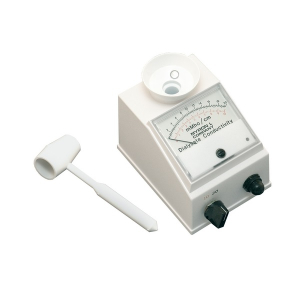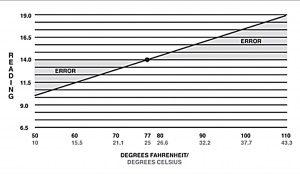Myron L D-2 Analog Dialysate Meter: 0-10 & 0-20 millimhos
- Specification
- Overview
- Customers Also Bought
- Your Recently Viewed Items
- Reviews

- $597.00 / Each
- Brand:Myron L
- Part #:D-2
- Regular Price:
$727.00 - $597.00
Overview
The choice of hemodialysis professionals for over 40 years, these compact instruments have been designed specifically to test dialysate solutions. By measuring electrical conductivity, they will quickly determine if dialysate concentrations are correct.
Easy to Use Dialysate Meter
To use these hand-held instruments, the operator simply fills the cell cup with dialysate solution and pushes a button. The needle indicates the total concentrations of salts in the solution.
The instruments have built-in cell cups and are completely self-contained. They are powered by 9-volt batteries which last for at least 2,000 tests. A glow light serves as a battery reserve indicator.
Thousands of Myron L Dialysate Meters are still in daily use around the world after years of reliable service.
Automatic Temperature Compensation: Why It Is Important
The graph below illustrates conductivity readings of a 14.0 millimhos dialysate sample tested with a non-temperature compensated conductivity meter. The same sample APPEARS to have a higher level of dialysate concentration when heated (and lower concentration when chilled). Actually, only conductivity readings change with temperature. Dialysate concentration does not change. Some instruments ignore the importance of temperature. Others require a separate thermometer for testing sample temperature then manual adjustment of the meter. All Myron L instruments, however, feature fast and precise Automatic Temperature Compensation. The result: a more accurate, useful instrument.

DIALYSATE METERS Features:
- Fast and accurate dialysate tests
- Models for both acetate and bicarbonate solutions
- Chip and crack resistant polyethylene cell cup
- Rugged design
- Simple to use
- Automatic temperature compensation
DIALYSATE METERS Applications:
- Hemodialysis
For more information, please see Data Sheet

